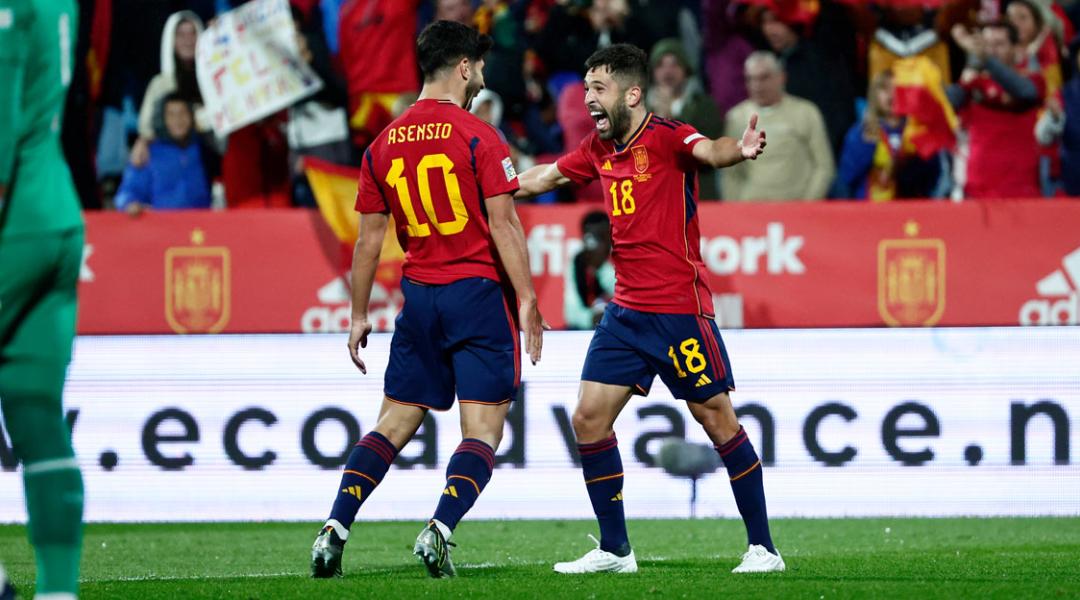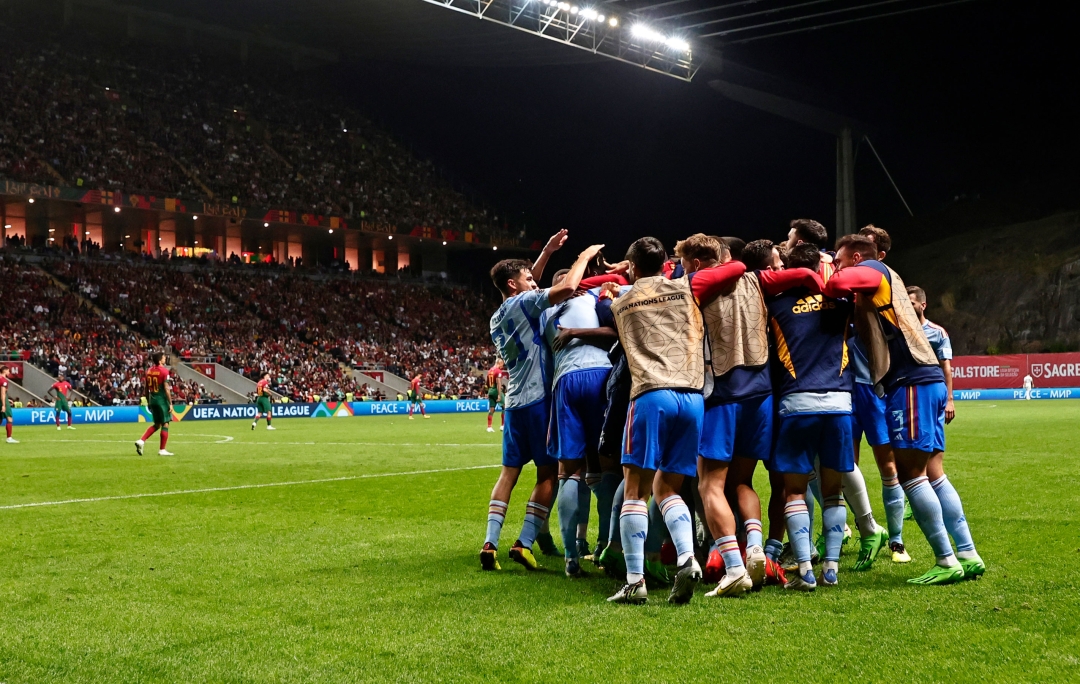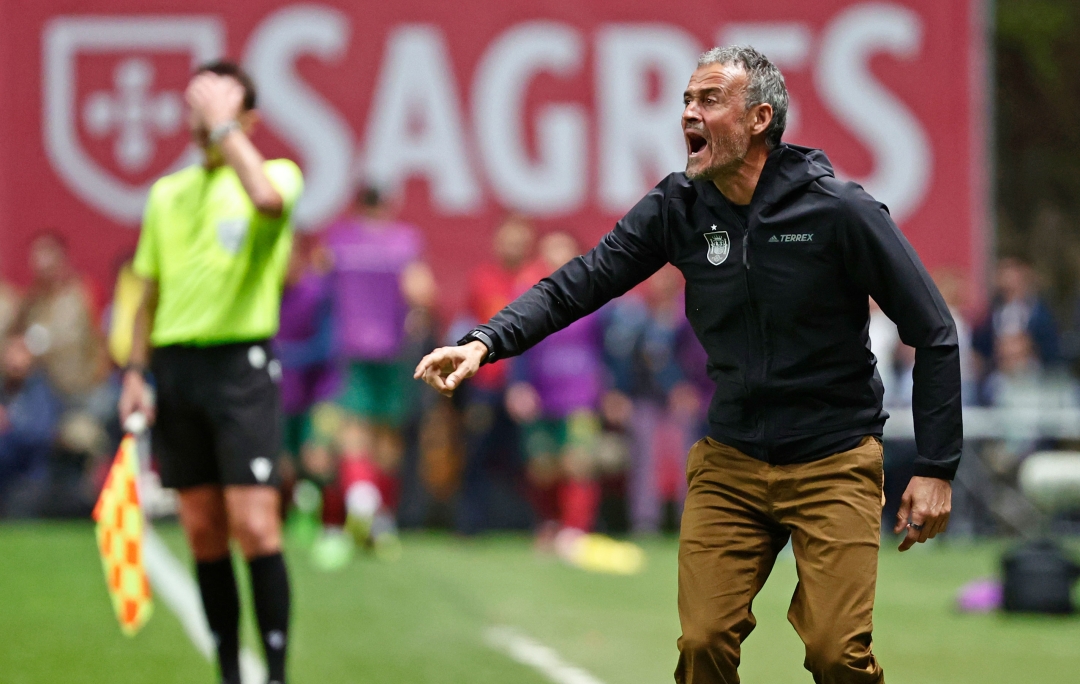Spain at Qatar
Fighting for that second star

Javier Clemente, who managed the Spanish national team between 1992 and 1998; Marcos Senna, who won the European Championship in 2008, starting an unrepeatable cycle; and Lara Gandarillas, who follows the team’s day-to-day, analyse La Roja’s chances at the World Cup. Although they admit that the competition is fierce, they’re optimistic and trust that the team will do well and get the whole country’s hopes up.
Spain is looking to return to elite football in Qatar. The winning streak between 2008 and 2012 (European Championship-World Cup-European Championship) that turned La Roja into the best team in the world, was followed by years of disappointment during which people started to doubt the style that so many teams —and football lovers— fell for. The arrival of Luis Enrique, who has navigated a complex generational handover, meant that the Spanish national team found a style again that allowed them to reach semi-finals in the last European Championship. Now, this talented squad needs to go one step further at the World Cup.
The team
“This is a young team with top technical quality, enthusiasm, and hunger for victory.” These words come from Javier Clemente (Baracaldo, 1950), who led the team between 1992 and 1998. He’s optimistic about the role Spain can play, although he doesn’t think that it’ll be a walk in the park for Luis Enrique’s players: “The main problem is that there are other teams who are also really good. With such fierce competition, anyone can beat you, that’s why you have to be strong physically, but also psychologically.”
Someone who knows about playing a World Cup —and winning a European Championship, specifically in 2008— with the Spanish national team is Marcos Senna (São Paulo, 1976). “Spain must defend the ideology of its coach and, after that, have a stroke of luck. It’s the toughest competition in the world,” he declares. To go far at a World Cup, as well as having a top team, a strong physique, and that stroke of luck, you also need to have a leader on the bench: “Spain has many things going for it. We have a combination of young people with a promising future and more experienced veterans, and we have a great coach.”
“With such fierce competition, anyone can beat you, that’s why you have to be strong physically, but also psychologically” — Javier Clemente
Lara Gandarillas (Torrelavega, 1990) covers the Spanish national team for Televisión Española (TVE) and thinks that Spain could play well. “Even if it’s not the main favourite, I believe that it’s one of the national teams that could do something significant at the World Cup.” Therefore, its young talent will be essential: “Pedri must lead a creative midfield, which must reach the top, and do so many things… That responsibility will fall on a lad who’s playing the World Cup for the first time. In terms of experience, Spain might be a bit lacking, but there’s no lack of talent.”

The Spanish national team players embrace during a match. © RFEF
Senna agrees Spain has some improvements to make but zooms in on the smaller details: “At the last European Championship, where we lost the penalties against Italy in the semi-finals, we were so close, so we must go one step further. Hopefully, we’ll compete again like we did at that European Championship and have that stroke of luck.” For Gandarillas, the main improvement they need to work on is the attack: “Spain is missing goals, but it has strikers that are capable of scoring.” She has a hopeful stance: “Spain was a semi-finalist at the European Championship and at the Nations League they stood up to France until the last minute. Why wouldn’t they fight for the World Cup?”
The manager
After training the Barcelona B team —as well as Roma and Celta de Vigo—, Luis Enrique had a brilliant time with the first team, with whom he won a treble (League, Cup, and Champions League) in 2015. In 2018, he took charge of the Spanish national team and, after a break for personal reasons in 2019, he returned to lead them to the semi-finals of the Eurocup in 2020 —held in 2021 due to the pandemic— and the Final Four of the Nations League, both in 2021 and 2022. A successful coaching career that Clemente didn’t envision when the Asturian played for him: “He took the decision afterwards and is proving to be a good coach.”
“Spain must defend the ideology of its coach and, after that, have a stroke of luck”— Marcos Senna
Gandarillas, who knows Luis Enrique well and has done countless interviews with him during his time as manager, believes that his hallmark is obvious: “He’s brought out the best in his players since he arrived. Spain always plays the same game, the one it knows and, up until now, it has worked.” For this journalist, his work goes one step further and aims for mental strength: “Luis Enrique has put together a team that not only makes the most of its technical and tactical talent, but that is also sure of its ideas and how to bring them to life on the pitch. This conviction has often helped him turn around matches that had turned into uphill battles.

Spain coach Luis Enrique gives orders from the touchline. © RFEF
The rivals
Spain is part of group E, alongside Germany, Costa Rica, and Japan. “It’s dangerous to say this, but it should be feasible,” Gandarillas assures us. And Senna agrees with this analysis: “Out of the three, the only one who can play on the same level as Spain is Germany.” The journalist considers both Japan and Costa Rica as inferior: “Costa Rica is one of the weakest rivals within the tournament, they were the last to classify and it came as a surprise. Japan could make it more difficult for Spain. Football isn’t mathematical, but the Spanish national team should be able to make it past the group stage without too much difficulty and fight to go as far as possible.”
“Spain was a semi-finalist at the European Championship and at the Nations League they stood up to France until the last minute. Why wouldn’t they fight for the World Cup?” — Lara Gandarillas
According to Senna, Costa Rica and Japan will play more defensively than Germany: “Costa Rica and Japan will look for the best way to defend themselves and try to surprise us during a counterattack. If those national teams try to play one-to-one against Spain, I think we’re far superior.” For this Spanish-Brazilian former player, Spain must be aware of defence throughout the tournament to not feel the pinch: “The key is being aware, so that they don’t catch us unprepared, and from there play our game.”
The favourites
There are always national teams that reach the World Cup in better shape than others. In this case, since it’s held mid-season, the unknown variables increase. On the one hand, any injury, no matter how slight, can be decisive. On the other, players are in better shape because they’ve played less matches. This World Cup is definitely more open, with more favourite teams. “Spain is one of the candidates to win, but alongside Spain there are six or seven more,” confides Clemente, who also points towards Brazil, Argentina, and France. Senna makes note of several favourites: “The traditional football favourites: Brazil, Argentina, Germany… or Spain. But careful with Belgium or Croatia. France is also really strong.”

Nico Williams, Carlos Soler and Marcos Llorente (from left to right) will be in Qatar. © RFEF
Gandarillas repeats practically the same names but highlights the canarinha: “Brazil is the number one candidate. They have a spectacular forward line. Tite has nine forwards, and their names are startling: Neymar, Vinícius, Antony, Raphinha... Then they also have a strong midfield and their weakest link is defence, especially the wingbacks. Then there’s also Argentina. It’s Messi’s last World Cup and they’ve built a team around him. And France, although it’s really difficult for a world champion to win again. I see Portugal, Belgium, and Spain on a second tier.”
On the 20th of November, when the ball starts rolling at the Al Bayt stadium, we’ll see if these predictions come true.


